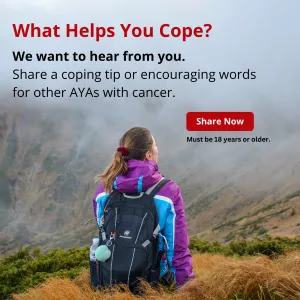How You Can Help a Young Adult With Cancer in Need

Adolescents and young adults with cancer, often referred to as AYAs, are loosely defined as people ages 15-39 years old. AYAs have specific needs that children and older people with cancer don’t necessarily have. Yet, people on the younger side of this range often get treatment tailored to children. And people on the older side of this range often get treatment tailored to older individuals.
When being socially supportive, there are 3 main coping strategies to remember:
- Share
- Listen
- Support
You can practice these coping strategies if you are an AYA or if you are part of an AYA’s support network (either online or in face-to-face support groups or networks).
Share
One of the main problems in the AYA community is the lack of support groups tailored specifically to their needs. Many AYAs have mentioned that they like to go to support groups, but they have a difficult time relating to older people in the group. The people in these groups are going through different experiences than AYAs. This can make AYAs feel isolated and like they don’t have an outlet to share their story.
AYAs have also said that the friends they had before their cancer diagnosis often become uncomfortable with the implications of cancer and struggle to be supportive. AYAs should be encouraged to join an online support community like CSC's MyLifeLine, a safe space to be heard and talk to others who are navigating similar experiences. Friends and loved ones who are supporting someone with cancer can also join MyLifeLine to connect with others, exchange stories and ideas, and offer encouragement and inspiration.
The more people who open up and share their experiences, the more hope AYAs and their supporters will have.

Listen
When an AYA is feeling out of control of their own life, you can be supportive by listening. Don’t be too quick to offer advice. Sometimes AYAs just want to be heard.
If you want to be a form of support for your friend or loved one, you can follow their progress and offer encouraging comments on posts they make on their online accounts. This will reassure them that there are people thinking about them and recognizing their concerns.
Another way to be a good listener is to make sure you aren’t being overly sympathetic. You should be cognizant of the fact that, yes, the AYA is going through an extremely difficult time. But you should also listen and talk about other aspects of their life. This can be a stress-reducer since it provides a break from the nearly constant talk about their diagnosis. Don’t forget they are much more than just a cancer patient.
Support
You don’t have to be a doctor to have an impact. Social support is a key factor in helping AYAs through tough times. Once an AYA opens up about their story, it is now time to be supportive. After being a good listener, you can educate yourself about the biological aspects of the specific cancer your friend or loved one has. This makes it easier to have meaningful conversations about how the AYA is feeling, rather than the AYA having to take the time to make sure you understand the technical processes of their treatment.
Another way to be supportive is by asking the AYA directly what they need help with. Often times, people will gift things to cancer patients when what they might actually need is financial support or tutoring if they are a student.
Furthermore, be sure to know your friend's goals. Do they want to finish school or return to work? What is their timeline for treatment? What do they want to accomplish? Knowing these things will help your AYA friend keep thinking and moving forward and help them to realize that a cancer diagnosis does not have to define them.
By practicing these coping strategies and using available support programs and resources, you can be an advocate and a supporter of AYAs across the country and world.

